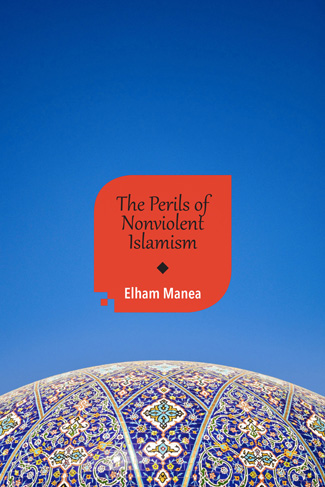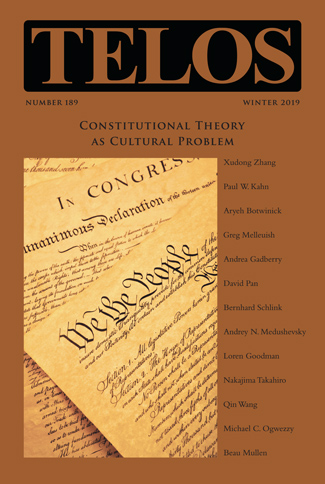By Telos Press · Monday, February 1, 2021 Now available from Telos Press Publishing: The Perils of Nonviolent Islamism, by Elham Manea. Order the paperback edition today in our online store and save 20% off the list price. Also available now in Kindle ebook format at Amazon.com. In today’s episode of the Telos Press Podcast, posted here, David Pan and Russell Berman talk with Elham Manea about her new book.
 The Perils of Nonviolent Islamism The Perils of Nonviolent Islamism
by Elham Manea
With a Foreword by Russell A. Berman
Elham Manea’s The Perils of Nonviolent Islamism describes the ways in which nonviolent forms of Islamist fundamentalism in European democracies lay the groundwork for Islamist terrorism. Through a persuasive mixture of autobiography, explanatory frameworks, case studies, personal interviews, and careful readings of source material, Manea details how Islamist groups have exploited the openness of democracies and multiculturalist attitudes in order to create closed Islamist communities. These groups today are transforming Islam in the West into a unified fundamentalist religion that ultimately promotes attitudes that lead to violence. Combining keen social theoretical analysis with critical self-reflection, Manea’s interrogation of Islamism sounds the alarm on a crisis that can no longer be ignored.
Continue reading →
By Russell A. Berman · Tuesday, August 18, 2020 The pandemic crisis has surfaced fundamental tensions between the scope of state power and commitments to democracy and dissent. Facing an emergency, the state must act vigorously, but liberal democracies are premised on understandings of basic rights, maximal freedom, and limited government, desiderata at odds with state power. This opposition has been playing out in different ways in the United States and in Europe, and in Europe nowhere more saliently than in Germany.
A recent controversy in Germany provides insight into the process by which the need to respond to the pandemic acts as a vehicle to enhance state power in a way that threatens basic freedoms. This is the core conflict: the genuine urgency of developing public health measures to contain the pandemic can contribute simultaneously to the augmentation of state power. Questions of the vitality of democracy are at stake, and not only in Germany.
Continue reading →
By Xudong Zhang and David Pan · Monday, December 16, 2019 Telos 189 (Winter 2019), a special issue on Constitutional Theory as Cultural Problem, edited by Xudong Zhang and David Pan, is now available for purchase in our store. Individual subscriptions to Telos are also available in both print and online formats.
 The challenges faced by the liberal democratic model of government in the twenty-first century have made constitutional theory into an urgent topic of global concern. Both the second Iraq war and the revolutions of the Arab Spring frustrated hopes of an easy global trajectory toward liberal democracy. If there was the hope that liberation would mean the establishment of liberal constitutional norms, the result has been that emancipation from tyranny does not naturally lead in a particular political direction. Meanwhile, established liberal democracies, from the United States to Europe to India, are facing upheavals that have prompted many to question the stability of the model itself, leading to the need to revise a constitutional theory that up to now has been built around the liberal democratic model. While the constitutional state, as theory and practice in modern Europe, North America, and Asia, continues to be the common point of reference, its stability and legitimacy can no longer be taken for granted, thus requiring renewed thinking about its history and cultural foundations. The challenges faced by the liberal democratic model of government in the twenty-first century have made constitutional theory into an urgent topic of global concern. Both the second Iraq war and the revolutions of the Arab Spring frustrated hopes of an easy global trajectory toward liberal democracy. If there was the hope that liberation would mean the establishment of liberal constitutional norms, the result has been that emancipation from tyranny does not naturally lead in a particular political direction. Meanwhile, established liberal democracies, from the United States to Europe to India, are facing upheavals that have prompted many to question the stability of the model itself, leading to the need to revise a constitutional theory that up to now has been built around the liberal democratic model. While the constitutional state, as theory and practice in modern Europe, North America, and Asia, continues to be the common point of reference, its stability and legitimacy can no longer be taken for granted, thus requiring renewed thinking about its history and cultural foundations.
Continue reading →
By David Pan · Thursday, September 14, 2017 The following paper was presented at the conference “After the End of Revolution: Constitutional Order amid the Crisis of Democracy,” co-organized by the Telos-Paul Piccone Institute and the National Research University Higher School of Economics, September 1–2, 2017, Moscow..
The idea of liberal democracy only makes sense because of a basic contradiction between liberalism and democracy. As a description of a form of government, democracy designates a government by the people, whose decision-making power would not be restricted by any higher authority. The power of democracy derives from its ability to mobilize a majority of the members of a political order for collective goals. This rule by popular will can also entail a freedom from higher authorities, including such entities like monarchs and aristocrats, but also ecclesiastical or moral authorities that would establish basic values for guiding decision-making. Since democracy alone would lack constraints on the popular will, liberalism, as a set of principles that include protection of minorities and freedom of expression, is needed to provide the limitations on democratic decision-making that protect democracy from erratic and changes in the public mood. As such, liberalism sets a limit on democratic power, and the basic contradiction between democracy and liberalism maintains a dynamic equilibrium between popular will and liberal principles that can be stabilizing due to its flexibility.
Continue reading →
By Telos Press · Friday, February 10, 2017 Constitutional Theory as Cultural Problem:
Global Perspectives
January 19–21, 2018
New York, NY
The International Center for Critical Theory and the Telos-Paul Piccone Institute will jointly host a conference entitled “Constitutional Theory as Cultural Problem: Global Perspectives,” to be held at New York University, New York, from January 19–21, 2018.
The challenges faced by the liberal democratic model in the 21st century have made constitutional theory into an urgent topic of global concern. Both the second Iraq War and the revolutions of the Arab Spring frustrated hopes of an easy trajectory toward liberal democratic constitutional orders. If there was the hope that liberation would mean the establishment of liberal democracy, the result has been that emancipation from tyranny does not naturally lead in a particular political direction. Such a conclusion presents fundamental problems for a constitutional theory that is built around a liberal democratic model.
Continue reading →
|
|
 The Perils of Nonviolent Islamism
The Perils of Nonviolent Islamism 







